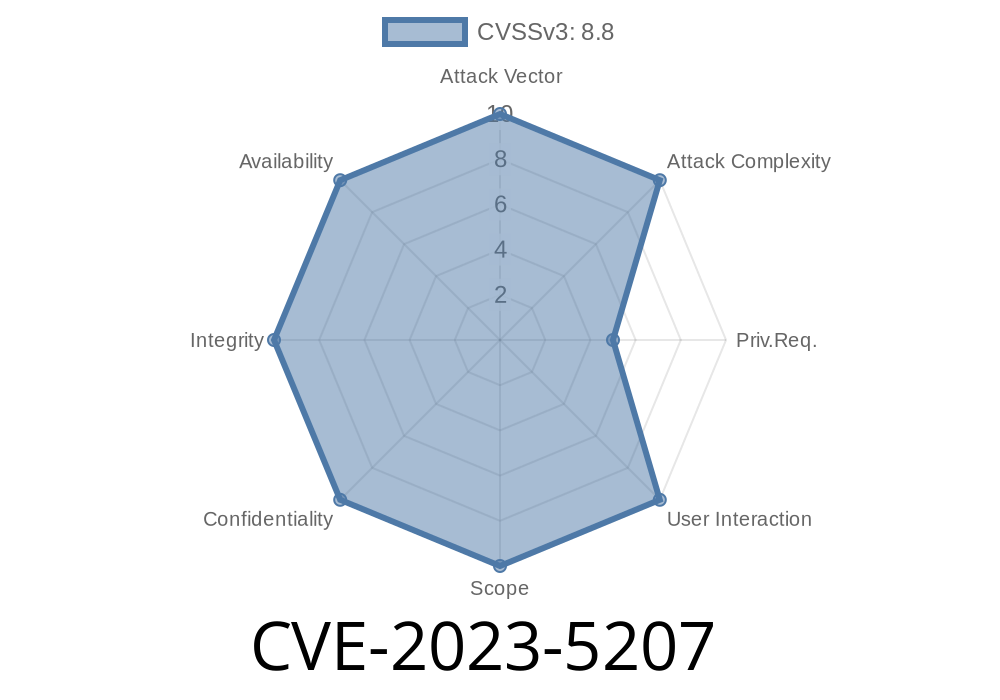> *Get ready to learn the details of an important GitLab vulnerability, with clear explanations, reference links, sample code, and insights into how attackers could exploit it.*
What is CVE-2023-5207?
CVE-2023-5207 is the official identifier for a security issue discovered in GitLab Community Edition (CE) and Enterprise Edition (EE). The bug affects:
16.4 prior to 16.4.1
Simply put, if you're running a version in those ranges and haven't updated—you're at risk.
The problem:
An authenticated user (someone who has logged in) can run a pipeline (that is, an automated process like build/test/deploy) with the identity and permissions of another user. This means attackers could abuse advanced privileges, trigger unwanted changes, or access protected resources in the context of a more privileged user account.
Why is it Dangerous?
Pipelines in GitLab often have access to secrets, deploy keys, and can trigger releases or interact with production services. If an attacker runs a pipeline as an administrator, for example, they could:
Change configurations, effectively gaining persistent control
This is a big deal, especially for organizations using GitLab for continuous integration/deployment (CI/CD).
Find a Pipeline Configuration
Attackers study the .gitlab-ci.yml pipeline configuration in target projects. They look for jobs that are automatically triggered by certain events or by user actions.
Manipulate User Context
Due to the flaw, attackers can craft an API request or use specific UI elements to force pipeline execution as another user. This might involve abusing features like pipeline schedules, manual triggers, or API endpoints that fail to properly check who is running the pipeline.
Run Malicious Job
The pipeline runs with the other user's privileges, granting the attacker access to secrets, environments, or actions they shouldn't have.
Vulnerable GitLab Code Pattern (Conceptual Example)
*Note: The real fix is in the backend logic, not tied to a specific user script, but here's a simplified version of how things might have gone wrong:*
# Before patch, in a vulnerable code area
def trigger_pipeline(user, project, params)
# FLAW: Insufficient verification of 'user' in this function
pipeline = Pipeline.create(
user: params[:run_as_user], # attacker can set this!
project: project,
config: params[:ci_config]
)
end
In this scenario, there’s no proper check that the run_as_user matches the currently authenticated user, so attackers can select any user—like an admin—to run pipelines as.
Real-Life Exploit Using GitLab's API
Once authenticated, a simple curl command using the GitLab API could be used to trigger a pipeline as another user:
curl -X POST "https://gitlab.example.com/api/v4/projects/:id/pipeline"; \
-H "PRIVATE-TOKEN: <attacker's token>" \
-d "ref=main" \
-d "run_as_user_id=<target_user_id>"
Recall: run_as_user_id is not a valid GitLab documented parameter—this is to help illustrate what the vulnerability *felt like* behind the scenes. In the actual bug, the attacker abused how the user context was handled during pipeline execution in combination with internal logic and available endpoints or features.
(For a more technical breakdown, see the references below.)
16.4.1
If you’re running an earlier version, upgrade immediately.
Official References
- GitLab Security Release: October 2023
- GitLab CVE-2023-5207 Advisory
- NIST NVD Entry for CVE-2023-5207
Audit Pipeline Access – review which users have access to sensitive or production pipelines.
3. Audit for Suspicious Pipelines – check logs for pipeline jobs run by unusual users, or secrets accessed by non-standard accounts.
Conclusion
CVE-2023-5207 is a classic example of how subtle backend logic flaws can have high impact. If left unpatched, any logged-in user in your GitLab instance could exploit this to run pipelines as someone else—even an admin.
Stay safe! Always keep your systems updated and audit for unusual activity after critical vulnerabilities like this are announced.
*If you want more technical discussion or need help checking your instance, drop a comment below or read the official advisory.*
Timeline
Published on: 09/30/2023 09:15:14 UTC
Last modified on: 10/04/2023 01:55:31 UTC
